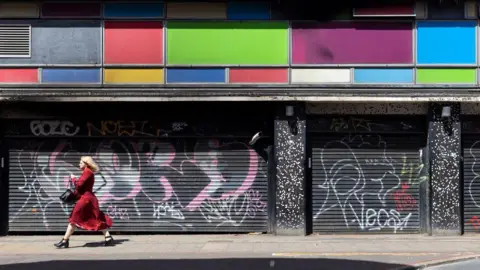Which areas are due to get share of £5bn funding boost?
3 hours agoKate Whannelpolitical reporter

 Getty Images
Getty ImagesThe government has announced up to £5bn of investment for 339 “overlooked” communities across the UK to spend on boosting high streets, parks and public spaces.
Under its Pride in Place programme, the government has also said it will give communities help to save pubs and libraries from closure and encourage councils to block “fake” barbers, as well as “unwanted” betting and vape shops.
Sir Keir Starmer said it represented a “huge investment”, and that those who “know their communities best” would decide how the money would be spent.
Conservative shadow communities secretary Sir James Cleverly said the money would be “dwarfed” by tax rises.
The announcement is part of Labour’s attempt to tackle the electoral threat posed to them by the rising popularity of Reform UK, which some in government believe is partly driven by a loss of pride in local areas.
The investment will see 169 areas get £2m every year for a decade, while a further 95 places will get a one-off payment of £1.5m.
The money will be targeted at improvements backed by the local community and could include projects to tackle littering and graffiti or building a new sports ground.
The government has said spending would only be approved if community groups, local organisations and social clubs have been involved in deciding how the money will be spent.
Unlike the levelling up funding scheme introduced under Boris Johnson’s Conservative government, councils would not put in bids to get the money.
The locations were selected based on a ranking of neighbourhoods using the Index of Multiple Deprivation (IMD) and Community Needs Index.
The money includes spending announced earlier this year, which saw £1.5bn pledged to 75 of the “most deprived” areas in the UK.
The government said that since the announcement, areas had been discussing how to spend the money.
It said that in Peterhead people were “ramping up CCTV to tackle anti-social behaviour”, in Blyth residents were putting on a cultural festival and investing in vacant properties and in Torbay there were discussions about funding an Agatha Christie heritage trail.
In addition to the money, councils in England and Wales will be encouraged to use powers to buy up “assets and eyesores” such as boarded-up shops and derelict abandoned businesses, allowing them to be used for projects such as local start-ups.
Disused department stores or empty office blocks could be repurposed into new health centres or housing, the government has suggested.
Communities already have a “right to buy”, making it simpler for them to acquire local assets such as village shops, pubs or children’s centres.
Under its devolution bill, currently going through Parliament, the government is doubling the amount of time local groups have to raise the money to make a purchase from six months to 12.
It also wants to include sports grounds in the list of assets covered by the new community “right to buy”.
As part of the Pride in Place programme, the government says it wants to encourage councils to block “unwanted” new betting and vaping shops, along with “fake” barbers.
The National Crime Agency has recently launched a crackdown on barber shops which it suspects of being fronts for international crime gangs.
The agency says it has growing intelligence that gangs use barber shops for money laundering by falsely presenting the proceeds of criminal operations as if they were earnings from legitimate businesses.
A government source told the BBC: “At the moment, the Tobacco and Vapes Bill already allows vape stores to be blocked.
“We want to potentially extend that to betting shops and fake barbers on high streets and we are looking for a legislative vehicle to do that as soon as possible.”
Cathy Parker is a professor of place management at Manchester Metropolitan University, and was the research lead on the high streets taskforce launched in 2019.
She told the BBC’s World At One that the “horse had bolted” in terms of high streets trying to compete with out-of-town retail park.
Town centres have to “invent themselves into things that matter to people, that they can’t get online and they can’t get out of town”, she added.
She said the government’s plan had “real potential” but the new funding and powers needed to be accompanied with “training and support” for local leadership.
“I’m not talking about political leadership. Local authorities are responsible for eight town centres on average. You need leadership to come directly from the town.”
Setting out the spending, Sir Keir said: “For too long, people have watched their towns and streets decline – powerless to stop boarded-up shops and neglected parks. That ends now.
“We’re investing in the UK’s future, by backing the true patriots that build our communities up in neighbourhoods across every corner of the country. Because it’s people who bring pride, hope and life to our communities.”
Conservative shadow communities secretary Sir James Cleverly said “Labour have been forced into this announcement to try to distract from the immense damage they are doing to businesses and communities by hiking taxes.”
A spokesperson for the Betting and Gaming Council (BGC) said betting shops “are far more than just places to have a flutter: they are community hubs, economic drivers, and a vital part of the high street’s future”.
Jamie Strachan, operations director at The Vaping Specialist, said: “We are concerned by suggestions that specialist vape stores could be unfairly grouped alongside ‘unwanted’ businesses” adding: “Vape stores like ours play a vital role in public health.”